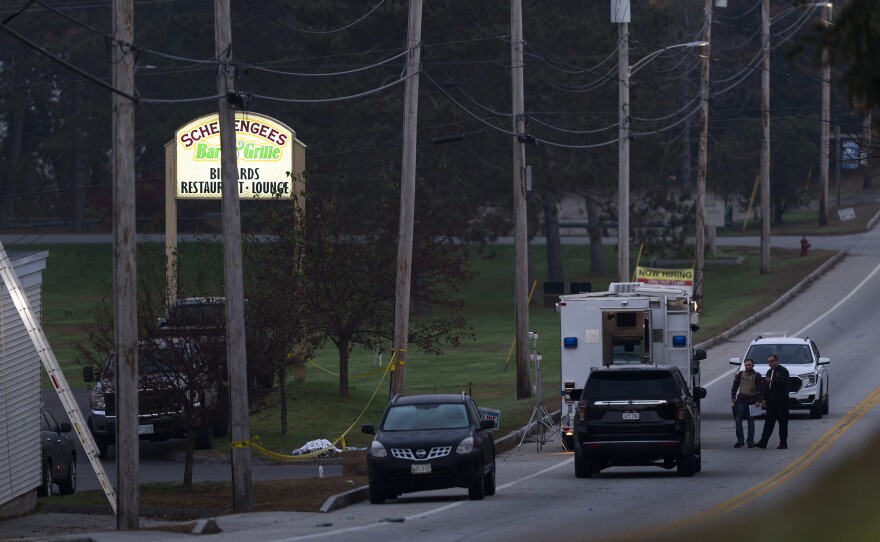It's been more than 36 hours since the mass shootings in Lewiston left 18 people dead. With the city and surrounding area still under a shelter-in-place order, law enforcement are asking Mainers for patience as they continue their investigation.
A large contingent of law enforcement personnel spent the day scouring an area near a boat launch where the suspect's white Subaru had been found abandoned.
At an impromptu roadside press conference, Maine Department of Inland Fisheries and Wildlife spokesman Mark Latti, said about 40 people are conducting a grid search by air, land and water.
"The helicopters is eyes in the sky," Latti said. "We are working with Brookfield Power, and they have lowered the amount of water going through the dam, which lowers the river and it gives the pilot and the observers in the helicopter a better chance to see through the water and see if there might be anything in the water."
In addition to helicopters, boats equipped with side scan sonar searched the river, while crews walked the banks.
Latti says many state and federal agencies are cooperating on the search, which allows them to fan out and cover as much ground as possible.
So why is the investigation taking so long? For one, Maine is one of the most rural states in the nation. Forests cover nearly 90% of the state.
Authorities also have protocol to follow. That means filing search warrants and waiting for approval from the courts before executing. on them. There's also the matter of processing evidence from the crime scene. At a press conference Friday morning, Maine's Department of Public Safety commissioner Mike Sauschuck emphasized the level of detail that's needed to comb through the various crime scenes.
"We have to take our time, we're going to be processing every square inch of these facilities," he said. "Not only do you have the victims in question, but every one of those rounds that got fired, need to be investigated. Every one of those cartridges that lays on the ground needs to be collected, the vehicles that are in those parking lots, everything that we do around this, we need to be careful. We need to be professional."
That means interviewing the around 70 people at the bowling alley and restaurant who witnessed the initial attacks. It means following up on more than 530 tips and leads sent in by the general public. And internally, it means putting extra attention on coordination and rotational shifts across the multiple law enforcement agencies working the case.
"Our officers [and] our investigators continue to work using that three o'clock that four o'clock in the morning, using that timeframe to kind of plan out what the next day is going to look like," Sauschuck said. "We have a morning briefing, which is kind of kicks off and says this is what's going to happen, we need a team to go do this, we need a team to go do that. This is who our team leads are, this is the process. And then we let those folks loose to go do the good work."
Sauschuck said investigators plan on filing more search warrants to find digital media from phones, computers, and other video from the area. He also cautioned against misconstruing standard search procedure with breakthroughs in the case.
"We won't be able to say every time we're hitting a location, 'Hey, we're going to be at this spot.' Because it's just not practical, and it's not safe for a lot of folks," he said. "Announcements and PA systems, a piece of that is us just getting notification that 'yes, in fact, we are the police. We are going to be knocking on this door, we would like you to come out if you're in there.' And some of that's just standard operating procedures from our end."
Sauschuck expects processing all the evidence will take at least several days. The Department will hold daily press conferences at 10 a.m. for the duration of the manhunt.







